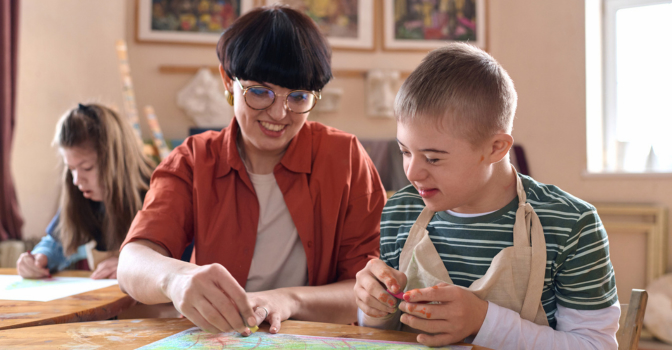On 14 December 2024, the NDIA announced an independent review to assess how music and art therapies are funded under the NDIS. The review will examine the effectiveness of these therapies, the qualifications of practitioners, and appropriate pricing. Current arrangements will remain in place until the review is completed, with no changes expected until 2025. This means you can continue your sessions as usual for now. Leap in! will keep you updated with any new information as it becomes available.
This story was first published on 10 December, 2024. In light of the 14 December update from the NDIA, the changes to the pricing guidelines outlined below have been paused. People on the NDIS can continue to access music and art therapies at the current price.
Recent announcements about changes to how the NDIS funds music and art therapy have raised concerns among many of our Members. We understand these therapies play a vital role in the lives of many people with disability.
In this update, we’ll explain what’s changing, why and how it might affect you.
What’s changing?
Here’s a summary of the key points:
- You can still access music and art therapy through the NDIS, but the operational guidelines have changed
- Evidence-based practice: All therapies, including music and art, must demonstrate clear, evidence-based benefits and outcomes related to your goals
- Review of current plans: Your plan may be reviewed to ensure services align with the new guidelines
- No immediate changes: Your current arrangements will continue until the new guidelines take effect on 1 February 2025.
New funding options.
On 26 November 2024, the NDIA announced changes to how music and art therapy are funded through the NDIS. These changes aim to clarify guidelines and ensure that participants can continue accessing these therapies in a way that supports their goals and community participation. Here’s what you need to know:
- If music or art therapy is stated explicitly in your NDIS Plan because it’s reasonable and necessary and based on evidence in your specific circumstances, you can continue accessing it as a support at the higher rate.
- If not, you’ll access these therapies using your Community Participation budget under the new guidelines.
You can use your Community Participation budget to fund music and art therapy in two ways:
1. One-to-one sessions.
- Rate: $67.56 per hour
- Requirement: Must be delivered by a registered provider.
2. Group sessions.
- Rate: $193.99 per hour (shared cost between participants)
- Requirement: Must be delivered to at least four participants by a registered therapy provider
- Benefit: To enhance community inclusion and participation.
Why are these changes happening?
These changes are part of the broader NDIS updates announced on October 3, 2024. The NDIS wants to ensure that all funded therapies align with the new support definitions and meet specific criteria.
An NDIS support is:
- Effective: Proven to help you achieve your goals
- Professional: Delivered by therapists who are registered with professional bodies. In the case of music and art therapy, this might include professional bodies such as the Australian Music Therapy Association (AMTA) or the Australian, New Zealand and Asian Creative Arts Therapies Association (ANZACATA)
- Goal-oriented: Directly supporting the goals outlined in your NDIS Plan
- Evidence-based: Demonstrates clear benefits related to your disability support needs.
What should you do next?
Navigating these changes might feel daunting, but there are steps you can take:
1. Talk to your music or art therapist.
- Discuss how the changes might affect your sessions
- Confirm their professional registration status
- Document the progress and benefits you’ve experienced.
2. Review your NDIS Plan.
- Check if music or art therapy is included as reasonable and necessary
- If not, discuss including it with your planner or support coordinator based on its benefits to you.
3. Prepare for plan reviews.
- Gather reports or assessments showing how these therapies help you achieve your goals
- Be prepared to discuss how the therapy supports your life during your next plan review..
Exploring other options.
If these changes impact your access to music or art therapy, you may want to explore community programs – local community centres often offer music and art activities.
We’re here to help.
At Leap in!, we understand that music and art therapies bring value to many of our Members. We’re committed to supporting you through these changes by providing clear information and updates as new details emerge.

